It can feel overwhelming, watching the news, hearing about economic uncertainty, and wondering what it all means for you and your family. I remember a time, not too long ago, when my own small business felt like it was teetering on the edge. The worry kept me up at night, and I felt helpless to control what was happening. It’s not just about the money; it was about the future, about providing for those I cared about. I know many of you feel the same way right now.
That’s why I'm so glad to share this curated list of books with you. These aren't just dry economics textbooks. They're stories, analyses, and guides that aim to shed light on how economies work, what happens when they stumble, and most importantly, what we can do to navigate those challenging times. I’m not an economist, but I am a firm believer that understanding the world around us, even in complex areas like finance, can empower us to feel more prepared and less afraid. This collection offers different perspectives – from the inside stories of major crises to practical advice for protecting your personal finances – all with the goal of helping us weather whatever storms may lie ahead.
Too Big to Fail: The Inside Story of How Wall Street and Washington Fought to Save the Financial System--and Themselves
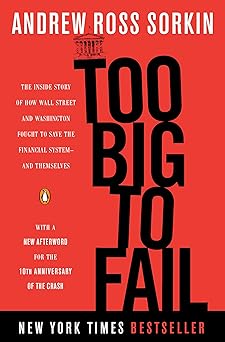
The story of the 2008 economic crisis is a complex and dramatic tale of power, greed, and fear that brought the world to the brink. It's a story of high-stakes decision-making, backroom deals, and ego clashes that tested the resolve of the world's top leaders. I was reminded of a high-stakes business deal I had years ago where the players were so focused on winning that they lost sight of the bigger picture. The crisis was a catastrophic failure of the system, with reckless lending practices, subprime mortgages, and financial institutions too big to fail. But it was also a story of remarkable heroism and resilience, as ordinary people did extraordinary things to protect their families and communities. The crisis was a wake-up call for policymakers and regulators, leading to tough reforms and greater oversight. Andrew Sorkin's book is a masterful account of the crisis, drawing on his years of experience as a financial columnist and his access to the players involved. He reconstructs the drama and turmoil of those days with precision and clarity, and his book is a must-read for anyone interested in understanding how the world came so close to collapse.
Discover this book on Amazon (affiliate link)
The Forgotten Depression: 1921: The Crash That Cured Itself
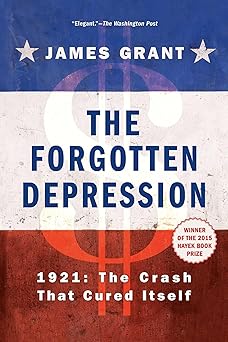
The Forgotten Depression is a fascinating and eye-opening book that delves into the depths of America's last governmentally untreated depression, which occurred in 1921. As I turned the pages, I couldn't help but think of the parallels with the current economic climate, where the wisdom of the past is often overlooked in favor of quick fixes and stimulus packages. The author masterfully weaves together a narrative that is both engaging and informative, making it easy to understand complex economic concepts. What struck me most was the stark contrast between the policies implemented by President Wilson and President Harding, which seemed to ignore the economic slump, and the subsequent actions of the Hoover administration, which ironically worsened the situation. The author argues convincingly that the well-intentioned but misguided attempts to prop up industrial wages ultimately led to a prolonged and devastating depression. I was particularly struck by the resilience of the American people during this time, who managed to bounce back from the economic downturn by the late 1920s, despite the government's inaction. As I finished reading the book, I couldn't help but wonder if we could have learned from the past and avoided some of the financial crises that have plagued our nation in recent decades. The Forgotten Depression is a thought-provoking read that challenges our assumptions about the role of government in economic downturns and offers a timely lesson that can be applied to today's economic landscape.
Discover this book on Amazon (affiliate link)
What To Do With Your Money When Crisis Hits: A Survival Guide
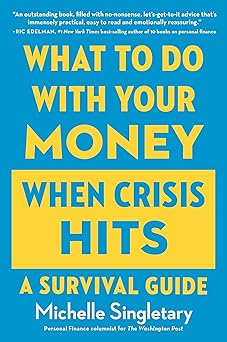
A financial crisis can be a scary and overwhelming experience, leaving you feeling lost and unsure of what to do. I remember a personal experience where I had to navigate a financial setback, and it was a difficult and emotional time. It's natural to feel anxious and unsure about how to handle your money when the market is down or you're facing a financial crisis. This book offers practical advice and expert guidance to help you weather the storm. The author shares her years of experience as a personal finance columnist to provide a clear and concise roadmap for dealing with financial setbacks. She addresses common concerns such as paying bills, managing debt, and cutting back on spending, while also offering strategies for staying calm and making informed decisions during uncertain times. The book is designed to provide a sense of security and confidence, helping you to make the most of a difficult situation and ensure that your financial future is stable and secure. By following the advice and strategies outlined in this book, you'll be better equipped to handle financial crises and make informed decisions about your money, even when things seem uncertain.
Discover this book on Amazon (affiliate link)
The End of Alchemy: Money, Banking, and the Future of the Global Economy
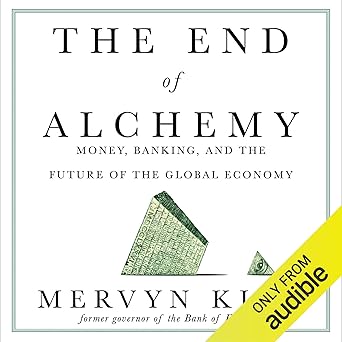
Our modern capitalist society is built on the foundation of two revolutionary ideas that have been with us for centuries: the creation of paper money and the invention of banks that issue credit. We take these systems for granted today, but they were once considered magical and groundbreaking. The Industrial Revolution was a turning point in history, and it was the widespread adoption of these two ideas that made technological innovations possible. Paper money became as valuable as gold, and long-term loans were transformed into safe short-term bank deposits. This is known as financial alchemy, the creation of extraordinary financial powers that defy reality and common sense.
As we look back on the history of money and banking, it's clear that these systems have brought us both huge benefits and catastrophic consequences. Financial alchemy has fueled economic growth for two centuries, but it has also led to hyperinflations, banking collapses, and the recent global recession. We're still struggling to come to terms with the potency of these ideas and their inherent weaknesses. How can we reconcile the strengths of these systems with their weaknesses? What can we do to create a more durable prosperity and move away from our reliance on the alchemy of our financial ancestors? Mervyn King, a man who knows these systems firsthand, offers us a fresh perspective on the history and future of money and banking, and his bold solutions cut through the complexity to provide a clear path forward.
Discover this book on Amazon (affiliate link)
Economic Crisis, International Tourism Decline And Its Impact On The Poor
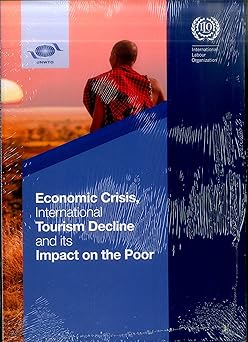
The 2009 global economic crisis had a profound impact on international tourism, leading to a significant decline in international tourist arrivals and revenues. This decline not only affected the tourism industry but also had a ripple effect on the lives of millions of people, particularly the poor and vulnerable. Many individuals lost their jobs, and income opportunities decreased, making it challenging for them to cope with the economic shock. In some countries, the decline in tourism led to a reduction in rural livelihoods, as many people relied on tourism-related activities for their income. The study conducted a comprehensive analysis of the macro-economic effects of the decline in international tourism, using large-N datasets and in-depth case studies of the Maldives, Costa Rica, and Tanzania. The researchers found that the decline in tourism had a disproportionate impact on households in these countries, exacerbating poverty and inequality. The study highlights the need for policymakers and stakeholders to consider the social and economic implications of economic crises on vulnerable populations, and to develop strategies to mitigate the impact of such crises on the poor and marginalized.
Discover this book on Amazon (affiliate link)